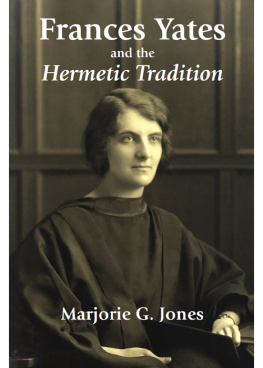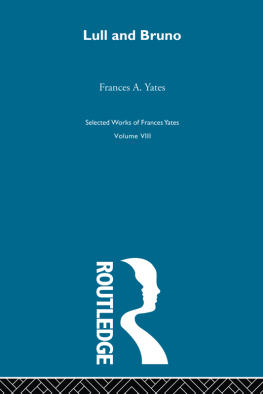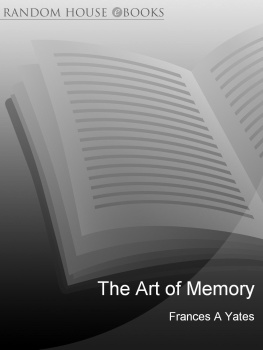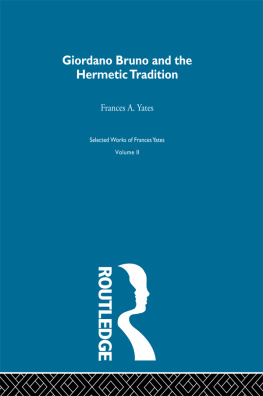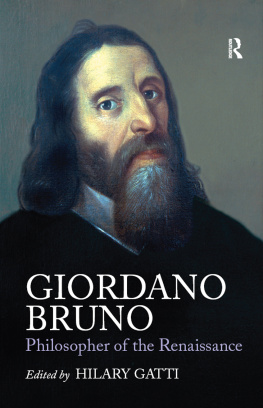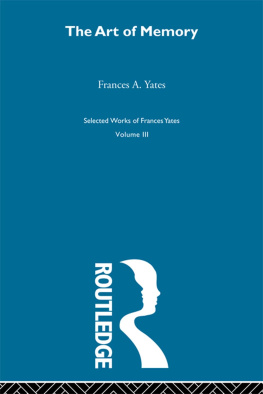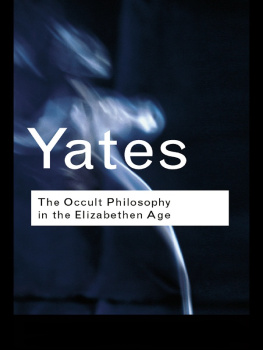
PRAISE FOR Frances Yates and the Hermetic Tradition
Marjorie Jones reveals the life, family, struggles, and intellectual passion of one of the great scholars of Renaissance Europe. Frances Yates and the Hermetic Tradition is a gift not only for those who have enjoyed Yates' books, but also for anyone curious about what it means to be a pioneering woman scholar in the twentieth century.
Natalie Zemon Davis
Professor Emerita, Princeton University
Among the most influential historians of the twentieth century Dame Frances Yates has finally found her biographer. With rare access to her personal papers, Marjorie Jones constructs an intimate portrait of a brilliant, sensitive but deeply lonely and, at times, sad woman. Unconventional in her education and approach to past ideas and religious impulses, Yates emerges as a figure we can appreciate for her humanity and hard-won wisdom. A triumph!
Margaret C. Jacob
Distinguished Professor of History, UCLA
In her excellent biography of Frances Yates, Marjorie Jones shows us that the story of the Renaissance and dividing line of the Scientific Revolution are neither simple nor neat. Frances Yates unfolded a provocative history of memory and Hermetic texts that grew and flourished alongside the works of Newton and Descartes.
Frank McCluskey
Provost, American Public University System
Marjorie Jones reminds us in this most readable and engaging biography that not only the liver but also the life situation of the scholar Frances Yates contributed to understanding the past from a perspective that is relatively free from the positivistic assumptions of our time. Ms. Jones uses the chronology of the life and times of Yates to elucidate the significance of the Hermetic tradition she discovered and to help the reader grasp its significance for our own time.
Louise H. Feroe
President, Mercy College, Dobbs Ferry, NY

Published in 2008 by Ibis Press
An imprint of Nicolas-Hays, Inc.
P. O. Box 540206
Lake Worth, FL 33454-0206
www.ibispress.net
Distributed to the trade by
Red Wheel/Weiser, LLC
65 Parker St. Ste. 7
Newburyport, MA 01950
www.redwheelweiser.com
Copyright 2008 by Marjorie G. Jones.
All rights reserved. No part of this publication may be reproduced or transmitted in any form or by any means, electronic or mechanical, including photocopying, recording, or by any information storage and retrieval system, without permission in writing from Nicolas-Hays, Inc. Reviewers may quote brief passages.
The quotations from Anglo Saxon Attitudes are reproduced with permission of the Curtis Brown Group Ltd, London on behalf of the Estate of Angus Wilson. Copyright Angus Wilson 1956.
Library of Congress Cataloging-in-Publication Data
Jones, Marjorie G.
Frances Yates and the hermetic tradition / Marjorie G. Jones.
p. cm.
Includes bibliographical references and index.
ISBN 978-0-89254-133-1
1. Yates, Frances Amelia. 2. HistoriansGreat BritainBiography. 3. Hermetism. I. Title.
D15.Y38J66 2008
940.2'1092dc22
[B] 2008022640
ISBN 978-089254-133-1
Book design by Studio 31.
www.studio31.com
14 13 12 11 10 09 08
7 6 5 4 3 2 1
Printed in the United States of America
www.redwheelweiser.com
www.redwheelweiser.com/newsletter
CONTENTS
The photo insert section follows page 104.
TO JONATHAN
ACKNOWLEDGMENTS
T HE GRADUATE FACULTY of The New School gave me a new lease on life when, at the age of 45, I was accepted into the Historical Studies program and allowed to pursue my M.A. degree one course at a time. There, I was privileged to be taught by the renowned Eric Hobsbawm, who first suggested I visit the Warburg Institute (of which, like Frances Yates when she first met Edgar Wind, I had never heard), Louise Tilly, Margaret Jacob, and visiting professor Jurgen Kocka of the Social Science Research Center of Berlin. When I panicked at the thought of trying to write a history paper so many years after leaving school, Professor Kocka offered just the right piece of advice: Don't worry, Mrs. Jones, he said, historians get better as they get older!
My professor and mentor Margaret Jacob, now at UCLA, supervised my thesis about the early unpublished writings of Frances Yates and, since then, has read portions of the manuscript with a critical eye and unfailing encouragement. Professor Jacob knew Frances Yates, who wrote several letters of recommendation for her, so, at the risk of self-agrandissement by including myself in their company, the chain of women scholars, which I discuss in this book, continues. While I never would dare consider myself the intellectual peer of either scholar, I hope that Frances Yates would not be displeased with this first biography of her. It was her intention to tell her own story, which she began a few years before she died but never completed.
When I first arrived at the Warburg Institute in the summer of 1995, J. B. Trapp, Frances Yates' literary executor, informed me that there were two old mildewed trunks of Yates family memorabilia in the basement and asked if I wanted to see them. Of course I did, and the rest, as they say, is history. To be invited to study at the remarkable Warburg Institute is a privilege, but to work there for extended periods of time over a ten-year periodalways aware of the great scholars who have studied and taught thereis transformative.
In addition to his hospitality, Director Charles Hope's early, candid, and careful reading of the manuscript has made this a better book, and I am grateful for his permission to access and use the Yates material.
Without the cordiality and support of Warburg archivists Dorothea McEwan and Claudia Wiederpohl, this book would not have been written. Spending time with them in the archives was an intense pleasure (enhanced by afternoon chocolates and tea) that has evolved into gratifying friendships. One of the downsides to finishing the biography is that I no longer will see them on a somewhat regular basis.
Ever sympathetic and insightful, Dorothea invited me to several meetings of the Companions of Cleopas, a London group of provocative dissident Catholics who graciously listened to my first public paper about Frances Yates.
Curator Elizabeth McGrath of the Warburg shared her memories of Francis Yates and prepared the photographs of her for publication here.
Hugh Trevor-Roper's literary executor, Professor Blair Worden, brought the Yates/Trevor-Roper correspondence to my attention and granted me access to read the Yates side of it at the Christ Church library at Oxford. Thanks to the hospitality of Judith Curthoys, the day I spent there was unforgettable. In Yates' later years, Trevor-Roper was an ardent supporter and great comfort to her. His warmth, sincerity, and humor are conveyed unabashedly in his marvelous letters to her, which beyond his renowned scholarshipmade me admire him even more. Blair Worden also was kind enough to review the later chapters of the biography that deal with their friendship.
My former Mercy College colleague Frank McCluskey, now Provost of the American Public University System and also an alumnus of The Graduate Faculty, read my thesis several years ago and urged me to develop it into a full-length biography. Since then, Dr. Frank, as he is known at Mercy, has been a staunch supporter at every phase of the project.
Next page
